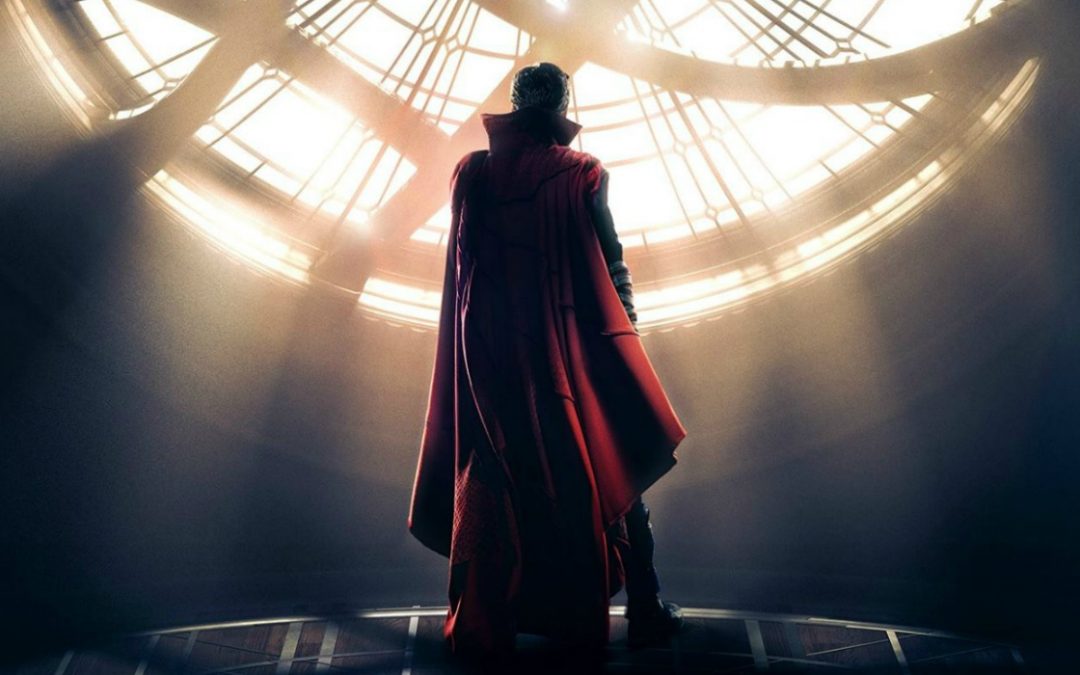 [Parent’s Content Advisory at bottom of review.]
[Parent’s Content Advisory at bottom of review.]
Note: After reading his review of “Dr. Strange,” the author of this article invites you to learn more about “Shadowlands and Songs of Light: An Epic Journey into Joy and Healing,” a new book that compares the writings of C. S. Lewis with the music of U2 in a life-changing journey through grief, joy, and longing for God. Available on Amazon and wherever books are sold.
“It’s not all about you.” It’s one of my favorite lines in “Dr. Strange” and in the Marvel series in general. I love this film’s emphasis on selflessness over self-absorption and self-centeredness. It is a very timely theme for our selfie culture.
But “Dr. Strange” brings us a very different kind of Marvel hero. And this hero is awash in an Eastern religious New Age smorgasbord paired–interestingly–with the latest trend in theoretical philosophy physics: the untested and unprovable belief in a multiverse (i.e. that there are an infinite number of parallel universes, not just ours, which makes our universe–and us–even less significant than secular/atheistic humanity previously thought). In the “Themes of Redemption” section, I’ll get into why the multiverse theory tells us more about the worldview of the scientists who support it than it does about reality.
Okay, so there’s a wonky physics theory in it. So what. But is it a good Marvel movie? That’s the real question for many moviegoers. They couldn’t care less about multiverses or single-verses or quadruplet-verses.
Well, yes, in terms of film craft, it’s quite good in many ways, but it’s not my favorite Marvel movie. It’s somewhere in the middle for me, with Iron Man 2 and Thor 2 being at the bottom and Civil War, Winter Soldier, and possibly Ant-Man being near the top. More on all that in the “Entertainment Value” section. Though Benedict Cumberbatch is the perfect Dr. Strange, and the visual effects are absolutely stunning. There are notable virtues in the film as well–edifying ones. The film is almost a fable of self-centeredness being changed into selflessness. It is a powerful portrayal (unintentionally, perhaps) of the Biblical principles regarding pride and self-sacrifice. Dr. Strange is a powerful messiah figure. He just happens to be a New Age sorcerer messiah figure.
Strange indeed.
Worldviews, Deeper Layers of Meaning in the Film: How the Multiverse Theory Denies the Christian Worldview
“Dr. Strange” is a dizzying glowing lava lamp of every new-fangled Eastern/New Age idea that American flower children embraced in the sixties. And, with its eager embrace of the questionable multiverse theory, it’s also a big sloppy kiss on the face of modern science and its exclusive humanist bent.
But, hey, this is Marvel, so “Dr. Strange” is, at least, by far the most entertaining New Age-secular humanistic pairing I’ve seen. And it doesn’t exactly take itself seriously. (This is Marvel. Remember that.) So it’s a little hard to get all up in arms over it. It’s also a very funny (and fun) movie in the way it approaches its subject matter.
But still, the hugely successful Marvel films reflect an ongoing mythology that Western culture has spun itself to fill the Christianity-shaped void in their lives. Dr. Strange is truly the perfect messiah figure for the post-Christian west. It’s stunning actually. His character is a walking, breathing symbol of what western civilization has become now that it has rejected Christ and sprinted deeper into the post-Christian forest it has grown for itself. Dr. Strange blends the Eastern spirituality so popular with non-Christians (and some Christians) with the humanity-is-not-significant-there-is-no-God creed of exclusive humanistic scientists.
Alright, so here’s the deal with the multiverse theory. It’s attractive to physicists because some of them think it explains what they call the “fine-tuning problem.” This so-called problem refers to the astonishing “fine-tuned” parameters of the universe–parameters that seem customized to benefit earth. These fine-tuned parameters suggest that everything in the universe has been fine-tuned to ensure that human life can exist and thrive. In other words, the “fine-tuning problem” is a problem because it suggests that the earth (and us) are very significant in some way that goes beyond the reach of physics.
This isn’t a problem for Bible-believing Jews and Christians because the Bible teaches that humans are indeed significant and that God established the limits of the universe in such a way to ensure our existence on earth.
But it has been a troubling thing for scientists who A) perhaps don’t like the Creator/Creation Judeo-Christian worldview; and/or B) don’t like the metaphysical and theological interpretations that the fine-tuning problem invites.
The multiverse gets rid of this problem–allegedly–which is why it is attractive to postmoderns. The multiverse is basically cosmology’s version of evolutionary theory in biology. The multiverse says there are an infinite number of universes out there, which means there is bound to be at least one universe that randomly contains the parameters that seem to be fine-tuned perfectly for the earth’s benefit. And, what do you know, we happen to be in that universe.
In other words, we are still insignificant accidents. Pay no attention to the fine-tunings.
We are not special, the universe isn’t even special, and we’re not made in the image of any God, or so the multiverse theory tells us. The multiverse also confidently explains that, with all these infinite parallel universes, every possible outcome of parameters exists, so a universe with all our earth-centric parameters was bound to exist.
But here’s the problem. The multiverse is about as easy to prove using scientific methods as it is to prove the existence of angels, demons, and God. The theory has actually been around for many years, and scientists were skeptical of it from the beginning.
In fact, one of the greatest living theoretical physicists today, Dr. George Ellis (who co-authored one of Stephen Hawking’s books) wrote a piece opposing the multiverse theory as early as 2008. Read what he writes in this piece published in the Oxford Journals [emphasis mine]:
The very nature of the scientific enterprise is at stake in the multiverse debate. Its advocates propose weakening the nature of scientific proof in order to claim that the multiverse hypothesis provides a scientific explanation. This is a dangerous tactic. Two central scientific virtues are testability and explanatory power. In the cosmological context, these are often in conflict with each other and there has been an increasing tendency in theoretical physics and cosmology to say it does not matter whether a proposal is testable: if it fits into our other theories in a convincing way, with great explanatory power, then testing is superfluous. The extreme case is the multiverse proposal, where no direct observational test of the hypothesis is possible. Despite this, many articles and books dogmatically proclaim that the multiverse is an established scientific fact.
In this context one must re-evaluate what the core of science is: can one maintain one has a genuine scientific theory when direct and indeed indirect tests of the theory are impossible? If one claims this, one is altering the meaning of science. One should be very careful before so doing. There are many other theories waiting in the wings, hoping for a weakening of what is meant by “science”. Those proposing this weakening in the case of cosmology should be aware of the flood of alternative scientific theories whose advocates will then state that they too can claim the mantle of scientific respectability.
Ouch. Those are strong words.
Conclusion
“Dr. Strange” might be built on worldviews and unproven scientific dogmas that I find problematic; but as I said earlier, it’s a little hard to get all up in arms about the film. Why? Because the film pokes fun at itself constantly and mercilessly. It’s a little hard to kick a film that’s already kicking itself. Regardless, many Christians will likely find the themes above distracting or hollow and will choose to skip this Marvel film. Others will just go for the visual fireworks, the trademark Marvel humor, and the top-shelf acting talent. It’s just a movie, after all, but it’s not just any movie.
It’s a Marvel movie.
That means it’s another chapter in America’s growing post-Christian mythology. Marvel comics are the modern soul’s mythology. I have to take a movie like that at least a little seriously, which is why I included an involved critique of the multiverse theory. Things like that–even when they’re coated with all sorts of humor and special effects–need to be challenge and discussed and not just swallowed whole without a second thought.
***
Want to read more reviews like this one? Sign up for our email alerts and get notified when we post a new review.
Content advisory for this film…
Note: The parental guidance content advisory is written from a Christian worldview. I am a person of faith with orthodox Christian beliefs like those expressed in “The Everlasting Man” by G. K. Chesterton, “Mere Christianity” by C. S. Lewis, and “The Pursuit of God” by A. W. Tozer. That being said, I do not believe that the depiction of evil, even graphic depictions of evil or negative themes in films, is in itself always immoral. I believe it depends on the context and the worldview behind the film’s depiction of evil. In addition, I try to report the content that gives the film its rating so that you can make an informed decision about viewing the film. Some people need to know detailed information about the content, some do not, in order to make a decision. I try to provide enough detail to give you a sense of the nature of the content. If you need more detail to make a better decision, I recommend visiting PluggedIn.com, as they provide extremely detailed reports of a movie’s content.
Sexual Content/Nudity/Themes of Sexuality:
Violence/Gore/Scary/Disturbing Content:
Language:
Alcohol/Drug/Smoking Content:


